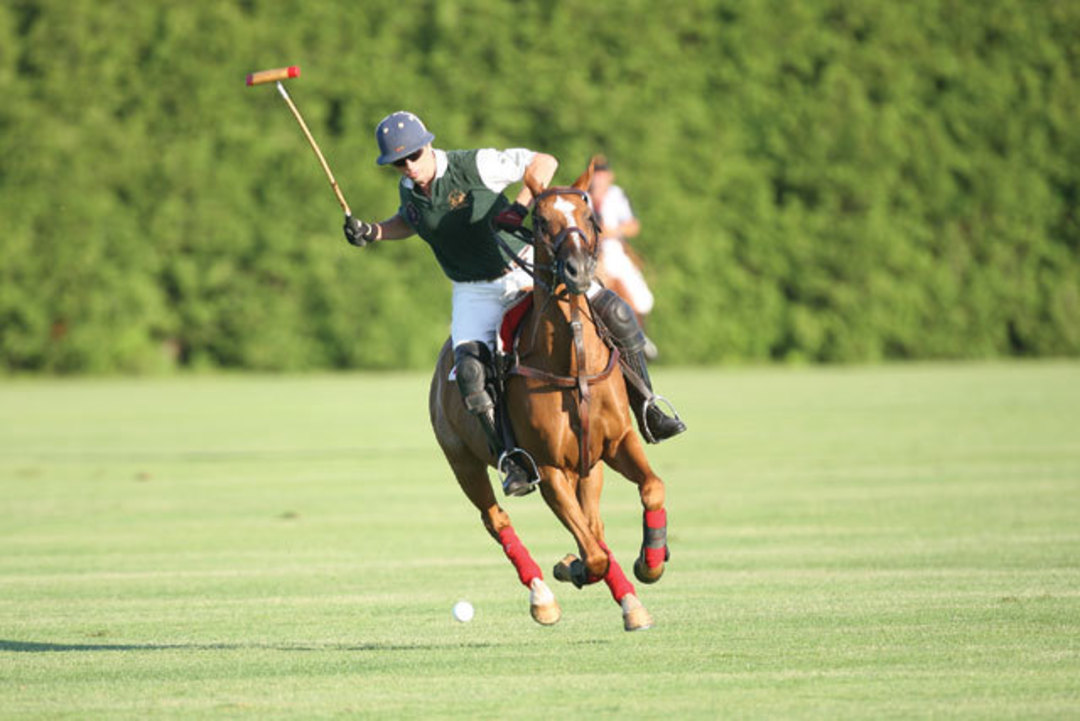An Afternoon at the Houston Polo Club

Trust us: you don't want to miss polo season at the Houston Polo Club.
Image: Shutterstock
When we think of September, only one thing comes to mind: polo season. Well, not really, but wouldn’t it be great if it did? After all, haven’t we been saying for some time that we want to run with a better crowd? Have a classier social life? Stomp some divots, or whatever it’s called? Okay, so let’s!
Houston Polo Club
The fall season begins September 7. thehoustonpoloclub.com
We are driving through Memorial Park, verdant and partially drought-recovered, eternal haunt of picnickers and runners in love with insane heat, when, right as we’re about to cross under the West Loop flyover, we see a sign for the Houston Polo Club, or rather two signs that pass for the same thing: “No Freeway Access” and “Private Driveway—No Trespassing.” We have passed the place a million times, stared at it vacantly while stuck in the parking lots known as I-10 and the West Loop, and yet knew nothing of what went on behind the hedges. It is high time that we did.
We turn onto the road, snake between rows of densely-planted, well-manicured foliage, et voilà—one of Houston’s most exclusive enclaves. We have heard that the 26-acre club, dating to 1928, has long been a favorite playground of the Houston elite, a place for oil barons, River Oaks heiresses, lost weekends spent sipping Courvoisier and commiserating about how hard it is to get good help in Tuscany. Oh, and time permitting, catching a few minutes of a polo match. We can’t wait.
It turns out that the club’s doors are open to anyone, or at least anyone willing to, well, pony up $20 for a ticket. We find ourselves dismayed by this, fearful that this might mean commingling with the riffraff. Sure enough, 20 bucks buys access not to the six-person private boxes on the rich side of the field, but the picnic tables on the poor side. We will take our seats with the unwashed masses, we vowed, but ignore everyone.
That too turns out to be unnecessary, however. At the po’folks concession stand, we discover that at the Houston Polo Club poor is a relative term, what with $100 bottles of G.H. Mumm Cordon Rouge champagne paired with something called a Jumbo Lump Crabtini. There are stylish women in bright sundresses and men sipping Glenlivet in Vineyard Vines polos or seersucker suits, just the sort with whom we’d wanted to watch… hey, look at that. The match has already started!
Off in the distance, undersized jockeys with their signature long-handled mallets and riding crops are galloping around trying to whack a wooden ball toward a goal. Or something. We feel oddly removed from the proceedings, not least because we are kept 20 yards from the sidelines, presumably a move by the club to protect patrons’ champagne bottles from errant balls.
“I come here for the fillies,” he says with an exaggerated wink. “The four-legged and the two-legged kind.”
Soon it’s halftime, the jockeys have ridden their horses back to the stables, and the moment we’ve been waiting for, the divot-stomping, has arrived. Divot-stomping, for all you non-blueblood types, involves patching with one’s feet the holes in a polo field created by horses. It is not ceremonial, it is for the riders’ protection. But if you are ignorant of divot-stomping, you are not alone. Apparently, few at the club are aware of its importance either, judging by everyone’s tendency to ignore the divots in favor of the jet-black Jaguar F-Type convertible that is driven onto the field for our collective edification.
We abandon the stomping, and just as we do, a middle-aged man in a Hawaiian-print shirt approaches us, a cocktail in each hand. He tells us that he spends every Sunday afternoon here during polo season. “I come here for the fillies,” he says with an exaggerated wink. “The four-legged and the two-legged kind.”
Uncertain as to why the man has chosen us for his equine confessions, and feeling a sudden urge to traipse across the field to see how the other half lives—or rather the other half of the one-percent—we extricate ourselves from the conversation. We arrive there just in time to see a Spanish classical guitarist serenading a crowd dining on catered Ruth’s Chris, also armed private security guards wandering the sideline, also two women handing out brochures for a charter jet service.
For a moment, we take in the smell of cigar smoke and old money, but then it is time for the second half of the match to start, and we retreat to our side of the field, where we order a few sliders from the grill. Back at our picnic table, a companion notes that our burgers were served to us wrapped in foil, whereas the sybarites on the far side of the field were given paper plates.
“Outrageous!” he shouts. Please lower your voice, we tell him. Class warfare is such an ugly thing.
